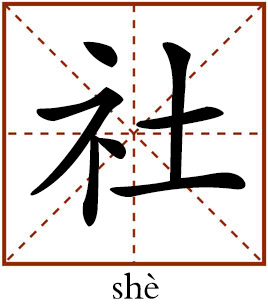Society

This character originally refers to the god of land. After the Zhou Court set the rule that every 25 households should have a she miao (a shrine to the god of land), this character became connected in meaning to administrative units at the grassroots level. Now this character generally refers to society or an agency.
左祖右社
zuǒ zǔ yòu shè
Zuo means “left” and you “right.” Zu refers to ancestor and she is the abbreviation of 社稷 (sheji) in which she refers to the god of land and ji the god of grain. Sheji generally symbolizes the state.
This term is a rule of the layout of the capital city in ancient China, originated from Kaogong Ji (Book of Diverse Crafts), an ancient classic work on science and technology.
According to the rule, in a capital city, the shrine of family or the ancestral temple (zu miao) should be built on the left of the south-facing imperial palace while the shrine of the state (sheji tan) should be on its right. The layout of the Forbidden City is a typical example of this rule. On the left of the imperial palace was the Imperial Ancestral Temple, and on the right, the Imperial Shrine of State, where the Emperor would venerate the spirits of his ancestors and the spirit of the nation, respectively. Today, these are the Beijing Laboring People’s Cultural Hall and Zhongshan Park respectively.
Behind the rule are two important traditional beliefs that have shaped the Chinese culture for thousands of years—ancestor worship and the sacred role that food has played in people’s life. Ancestor worship is often associated with the Confucian notion of filial piety. Rituals designed to commemorate and venerate the spirits of one’s deceased forebears are the most enduring Confucian ritual practice and are still performed in China today.
“To the ruler, the people are heaven; to the people, food is heaven” is an old saying in China. As an agricultural country with a long history of farming, harvest was significant to the governance of a state in ancient China. Rulers and their people developed various rituals to pray for a good harvest. Therefore, building the imperial palace between the shrine of ancestors and the one for the state indicates the wish that the country could be prosperous and people could live in peace.
Edited by REN GUANHONG
